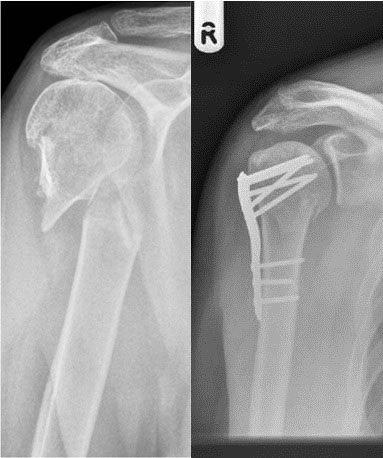Surgery v slings: clinical trial finds no major difference for some shoulder fractures
-
Research
- Health and Wellbeing
Posted on 5 August 2015
Patients with some types of serious upper arm injuries can be treated just as effectively with a simple sling, rather than surgery, according to research by our health scientists.

Our study will help surgeons decide if they should be operating or not”
The study by the York Trials Unit found that patients fared no better from surgery compared with non-surgical treatment for displaced fractures in the humerus bone in the upper arm near the shoulder. The results could change clinical practice and lead to cost savings for the NHS.
Researchers at York carried out the work in collaboration with South Tees Hospitals NHS Foundation Trust, the lead clinical centre, and Teesside University, the trial sponsor.
The study focused on patients with a displaced fracture involving the surgical ‘neck’ at the top of the humerus, an injury which often happens when patients fall onto an outstretched hand, causing bone damage at the top of the arm.
Metal implant
Surgery usually requires stabilising the misaligned bone with metal plates or screws, or replacing the head of the humerus with a metal implant.
The alternative non-surgical treatment is for patients to wear an arm sling for around three weeks. Typically, patients have physiotherapy as part of their rehabilitation.
The research project, known as the ProFHER Trial, involved over 30 hospitals across the UK. It was funded by the National Institute for Health Research (NIHR) Health Technology Assessment Programme. Most of the 250 patients recruited for the trial were women aged over 60 years.

Clinical outcomes
“Essentially what we found was that surgery would not give you better clinical outcomes over a two-year period compared with being treated with a sling,” explained Dr Stephen Brealey, Trial Manager at York.
Dr Brealey added: “Surgery performed under anaesthetic always carries risks. We have an increasingly elderly population who are potentially more prone to this type of injury and our study will help surgeons decide if they should be operating on them or not.”
Orthopaedic research
The ProFHER trial is just one example of orthopaedic research underway at York where the Trials Unit is developing an emerging specialism in this field. Treatment options for wrist bone fractures and frozen shoulder are also currently the subject of research at York.
The trials team, part of the Department of Health Sciences, has also gained funding for a British Orthopaedic Surgery Research Centre (BOSRC) to help orthopaedic surgeons develop research proposals.
Dr Brealey said: “There’s growing interest in research around the best options for treating orthopaedic patients. Surgeons want to understand what’s best for their patients, while at the same time making the best possible use of resources.
“Our research will help to inform treatment options which will benefit surgeons, patients and the health service.”
Further studies are planned to find out if the ProFHER project has prompted any changes in clinical practice.
The text of this article is licensed under a Creative Commons Licence. You're free to republish it, as long as you link back to this page and credit us.

Dr Stephen Brealey
A former diagnostic radiographer who now co-ordinates trials of treatment for musculoskeletal conditions in secondary care.
Discover the details
Surgical vs Nonsurgical Treatment of Adults With Displaced Fractures of the Proximal Humerus The ProFHER Randomized Clinical Trial was published in the Journal of the American Medical Association (JAMA)
The research is also published on the NHS National Institute for Health Research Journals Library
Find out more about the frozen shoulder and wrist fracture trials currently underway at York
The ProFHER trial was funded by the National Institute for Health Research (NIHR) Health Technology Assessment Programme (project number 06/404/53)
Explore the work of the British Orthopaedic Surgery Research Centre (BOSRC)
(The views and opinions expressed here do not necessarily reflect those of the HTA Programme, NIHR, NHS or the Department of Health.)
Visit the Departments
- York Trials Unit
- Department of Health Sciences
Explore more research

A research project needed to spot trees on historic ordnance survey maps, so colleagues in computer science found a solution.

We’re using gaming technology to ensure prospective teachers are fully prepared for their careers.

A low cost, high-accuracy device, could play a large part in the NHS's 'virtual wards'.
